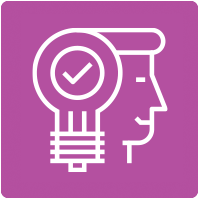-
Cyber Security
We help you protect your computer systems and networks from disclosure, theft or damage to what matters most – your information. We build both management systems and technical controls to harden your defences against the rising threats and vulnerabilities in today’s connected world.
-
Digital Process Transformation
We bring Digital Transformation and Business Process Re-engineering together in our own unique methodology. Transforming your workflows, automating tasks throughout your organisation in areas such as Finance, HR, Production, Sales, Logistics, Manufacturing, Warehousing and Supply Chain.
-
Consultancy is at the heart of everything we do at Unleashed
All of our work is a two-way collaborative process, listening to our customers needs and working as part of a team. As a project-based IT, Transformation, Cyber Security and Management Systems Consultancy, we bring our Subject Management Expertise (SME) to enable best in class project performance.
-
IT Solutions
We have over 20 years of specialist IT knowledge, we bring together our passion for IT with our knowledge of Cyber Security, Management Systems and Transformation with our customers unique needs. We offer Business Continuity, Data Backup, Storage, Disaster Recovery, Internet, IT Support, Microsoft 365, Networking and Telephony.
Cyber Security
Threats and vulnerabilities can be human or digital, we help develop systems to protect against both
We work in both Cyber and Information Security, developing systems to protect what matters most – your data. Whether we need to develop practical controls with our best-in-class Cyber supply-chain or implement written controls in the form of Management Systems. We have a solution for your organisation.
Digital Process Transformation
Putting transformational change in the hands of the people who know your business the best – you
We have a both a consultancy model and selection of products and solutions to enable you to transform your business processes at the least cost, with minimum resistance. Whatever your workflow, process or need, we have a solution.
Consultancy
Unleashed have forged long term, two-way relationships with many of our clients through what we do
Consultancy is what we do, whether it’s in our specialisms or more broadly. We have worked on a wide variety of projects in many sectors including, Retail, manufacturing, Construction, defence, nuclear and legal.
IT Solutions
Whether as part of a consultancy, transformation, cyber security or simple IT project, we will always support what we have done
We offer a broad range of IT Solutions such as Business continuity, Data Backup, Storage, Disaster Recovery, Internet, IT Support, Microsoft 365, Networking and Telephony. Anything that Unleashed do can be taken with Support as a Managed Service.
Cyber Security
Threats and vulnerabilities can be human or digital, we help develop systems to protect against both
We work in both Cyber and Information Security, developing systems to protect what matters most – your data. Whether we need to develop practical controls with our best-in-class Cyber supply-chain or implement written controls in the form of Management Systems. We have a solution for your organisation.
Digital Process Transformation
Putting transformational change in the hands of the people who know your business the best – you
We have a both a consultancy model and selection of products and solutions to enable you to transform your business processes at the least cost, with minimum resistance. Whatever your workflow, process or need, we have a solution.
Consultancy
Unleashed have forged long term, two-way relationships with many of our clients through what we do
Consultancy is what we do, whether it’s in our specialisms or more broadly. We have worked on a wide variety of projects in many sectors including, Retail, manufacturing, Construction, defence, nuclear and legal.
IT Solutions
Whether as part of a consultancy, transformation, cyber security or simple IT project, we will always support what we have done
We offer a broad range of IT Solutions such as Business continuity, Data Backup, Storage, Disaster Recovery, Internet, IT Support, Microsoft 365, Networking and Telephony. Anything that Unleashed do can be taken with Support as a Managed Service.
A few words from our clients
Don’t just take our word for it – we can put you in touch with our reference sites
Unleashed did a fantastic job on enabling our workforce to have access to our systems around the country on various building sites.
I’d just like to thank the guys at Unleashed for their excellent work upgrading our IT infrastructure with minimal downtime.
In a weekend, Unleashed upgraded our old telephony systems to a modern collaboration solution, with remote working, redundancy and a host of new features.














